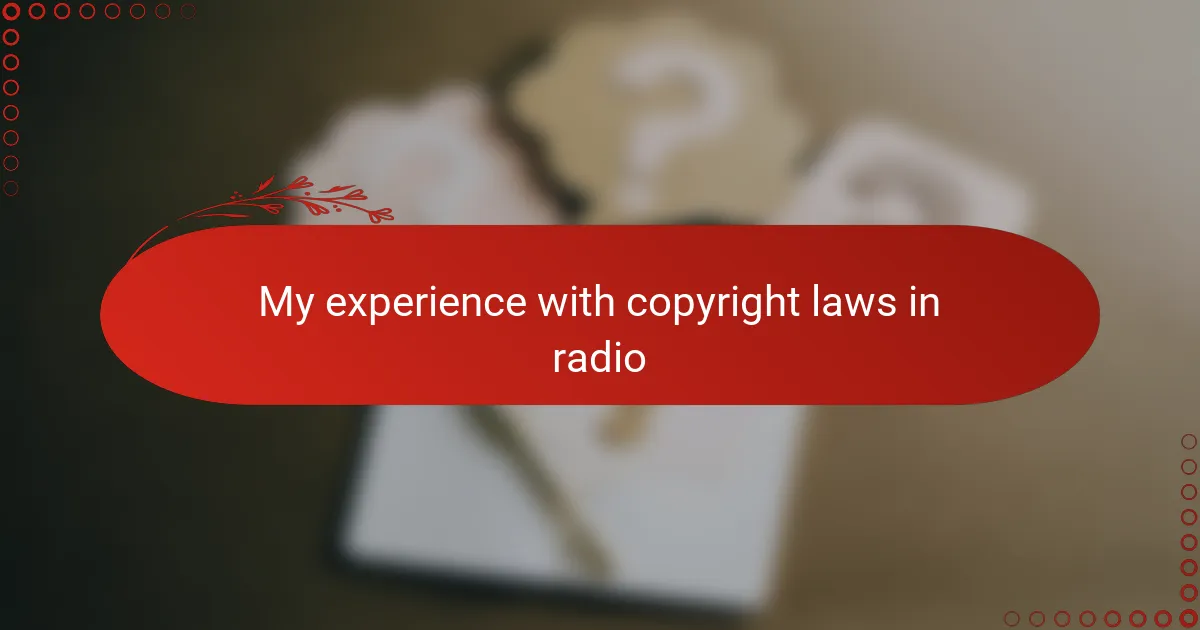Key takeaways
- Understanding copyright laws is essential for broadcasters to protect original works and maintain ethical practices in radio programming.
- Common challenges include navigating fair use, managing paperwork and licensing fees, and making quick decisions during live shows regarding song requests.
- Implementing organized systems for tracking licenses, building relationships with licensing agencies, and educating the team on copyright basics can greatly enhance compliance and reduce legal risks.
- Personal experiences with copyright disputes emphasize the emotional and professional stakes involved, highlighting the importance of proactive management and open communication with rights holders.
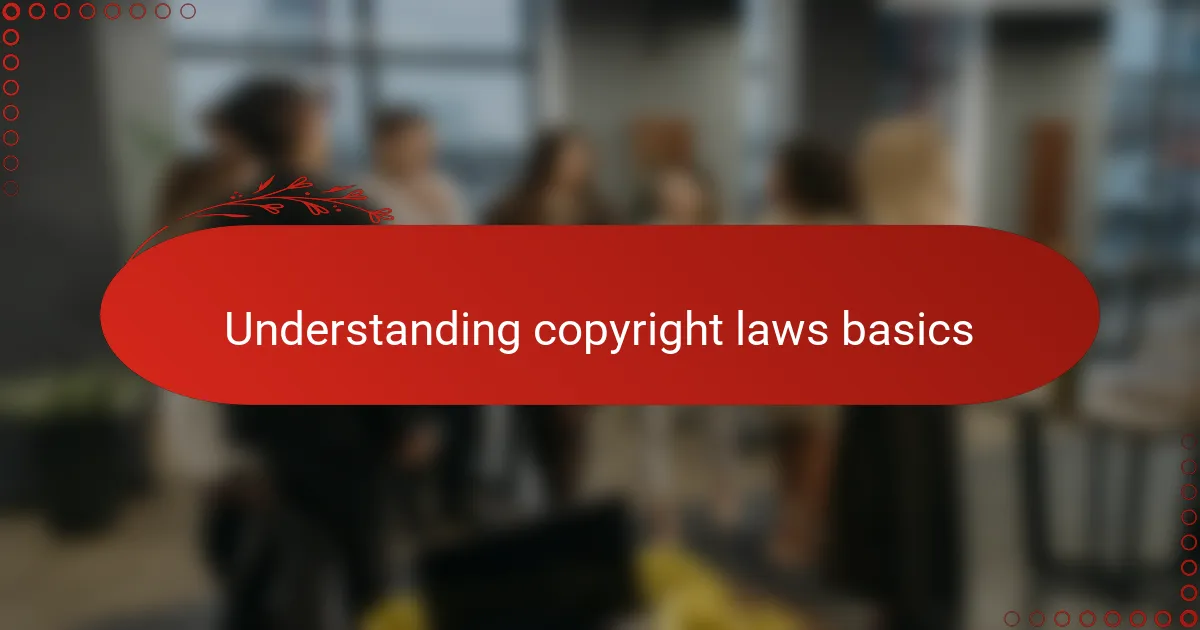
Understanding copyright laws basics
When I first delved into copyright laws in radio, I quickly realized that understanding the basics is crucial. At its core, copyright protects original works—songs, scripts, recordings—from being used without permission. But how often do we, as broadcasters, pause to think about the weight behind playing a simple track on air?
One time, I played a song without realizing it required licensing, and the aftermath was a sharp wake-up call. That experience made me appreciate that copyright isn’t just about legalese; it’s about respecting creators’ efforts and the rules designed to keep the industry fair. Isn’t it fascinating how something so invisible can impact what we do daily?
From my perspective, knowing these fundamentals helps prevent pitfalls and fosters trust in the broadcasting community. It’s not just a box to check but a foundation that shapes ethical radio programming. Have you ever considered how many layers lie beneath that catchy tune you hear on the radio?
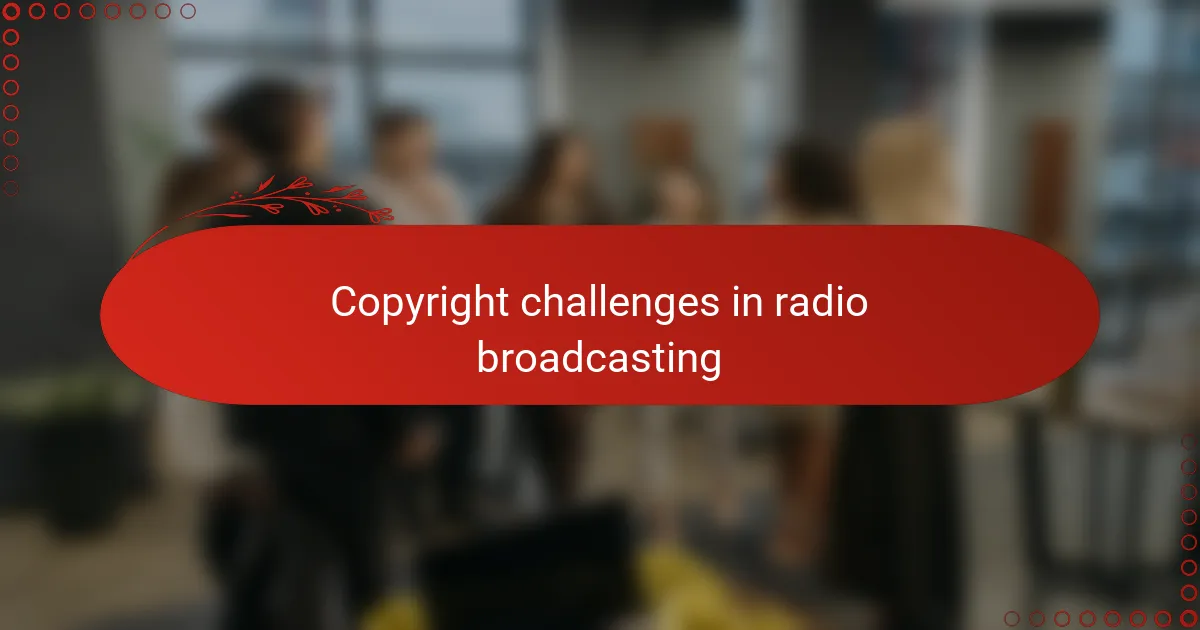
Copyright challenges in radio broadcasting
Navigating copyright in radio is tougher than I initially thought. There’s this constant juggling act between wanting to share great music and making sure every license is in place. I remember stressing over whether my station had cleared every single track for broadcast — it felt like walking a tightrope without a safety net.
What really caught me off guard was how complicated it gets with live shows or when listeners request songs on the spot. How do you secure permission quickly enough without interrupting the flow? That challenge taught me just how fast-paced and unforgiving radio can be when copyright rules come into play.
And then there’s the emotional side: knowing that one slip-up could mean fines or losing credibility. It’s a lot of pressure, but it also made me appreciate how these laws protect artists and keep the radio world honest. Have you ever felt that same mix of excitement and anxiety when handling music rights on air?
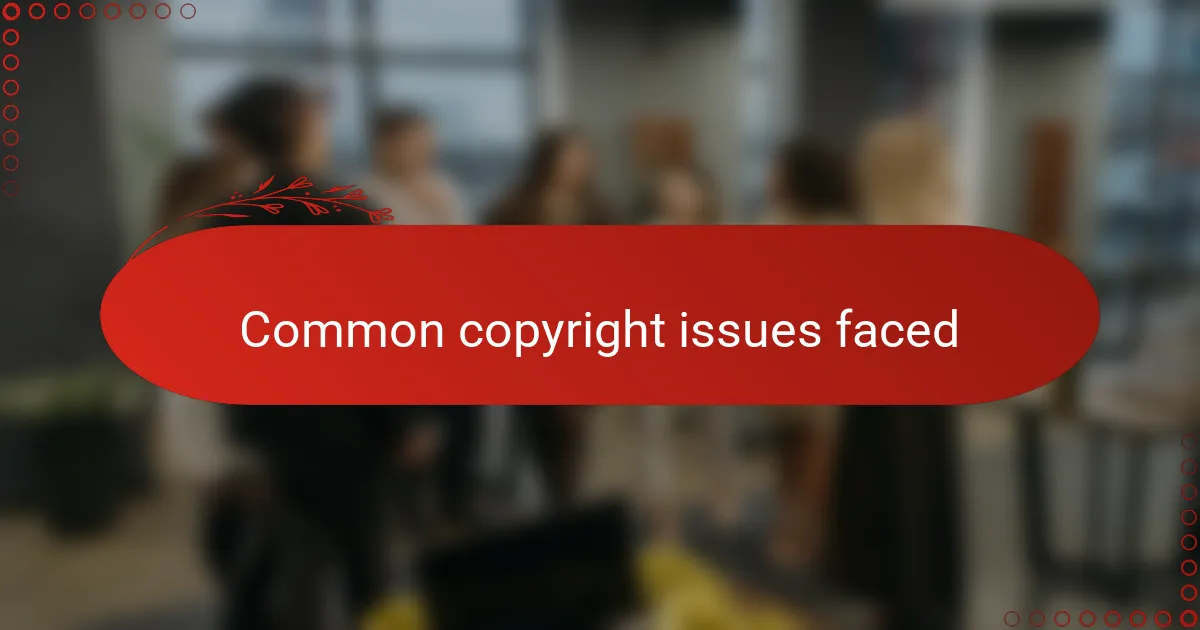
Common copyright issues faced
One of the most common copyright issues I’ve faced is understanding the fine line between what’s allowed under fair use and what isn’t. I once found myself second-guessing if a brief clip from a popular song could be played for commentary without breaking the rules. That uncertainty can be nerve-wracking, especially when on-air decisions have to be instantaneous.
Another frequent hurdle is dealing with the paperwork and licensing fees. At times, I felt overwhelmed by the sheer volume of permissions required just to keep the music rolling. Have you ever wondered how small stations manage to keep everything compliant without massive resources? It’s a constant balancing act between budget constraints and legal obligations.
Then there’s the tricky situation of live requests and unscripted moments. I recall a moment when a caller asked for a track not covered by our usual licenses, and I had to choose between honoring the request or staying safe legally. That split-second decision reminded me how unpredictable radio can be and how copyright challenges demand quick thinking.
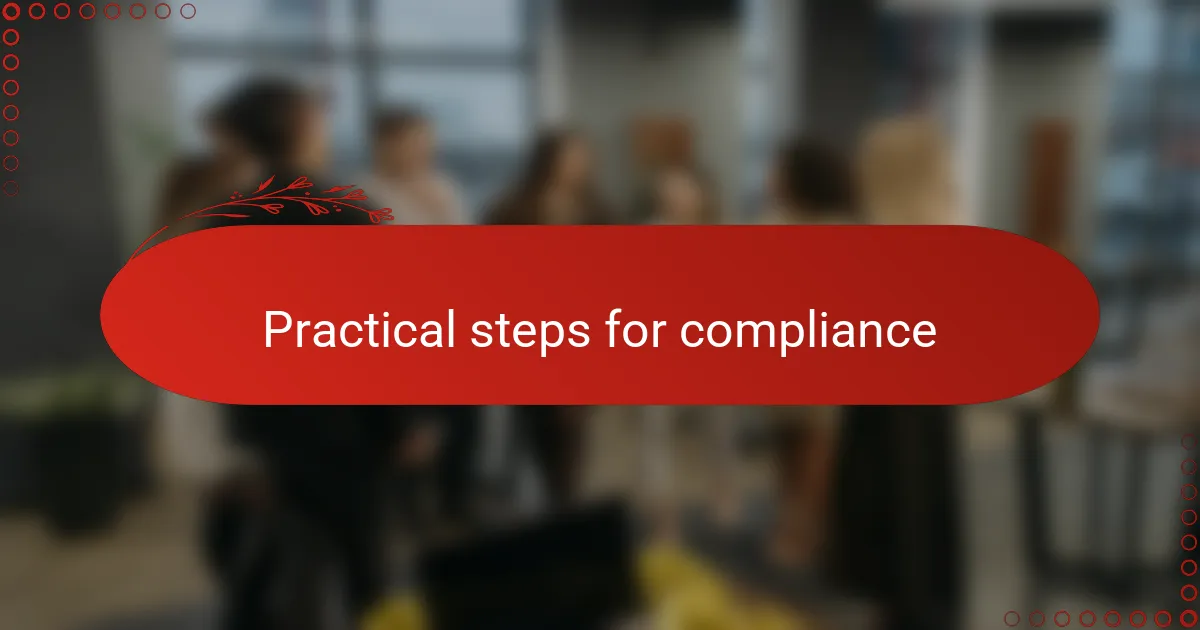
Practical steps for compliance
One practical step I found essential was setting up a reliable system to track all licenses and permissions. Early on, I juggled paperwork manually, which often led to confusion and stress. Have you tried using digital tools or spreadsheets to organize your music rights? For me, this small change brought clarity and peace of mind.
Another strategy that made a difference was building strong relationships with licensing agencies and rights holders. When questions or urgent situations arose, having a direct contact helped me get quick answers instead of scrambling in uncertainty. Isn’t it reassuring to know exactly who to reach out to when time is tight on air?
Lastly, I made it a habit to train everyone involved in programming about copyright basics. Sharing my own near-miss experiences sparked conversations and heightened awareness across the team. How often do we underestimate the power of collective knowledge? In my experience, a well-informed team is the best defense against costly mistakes.
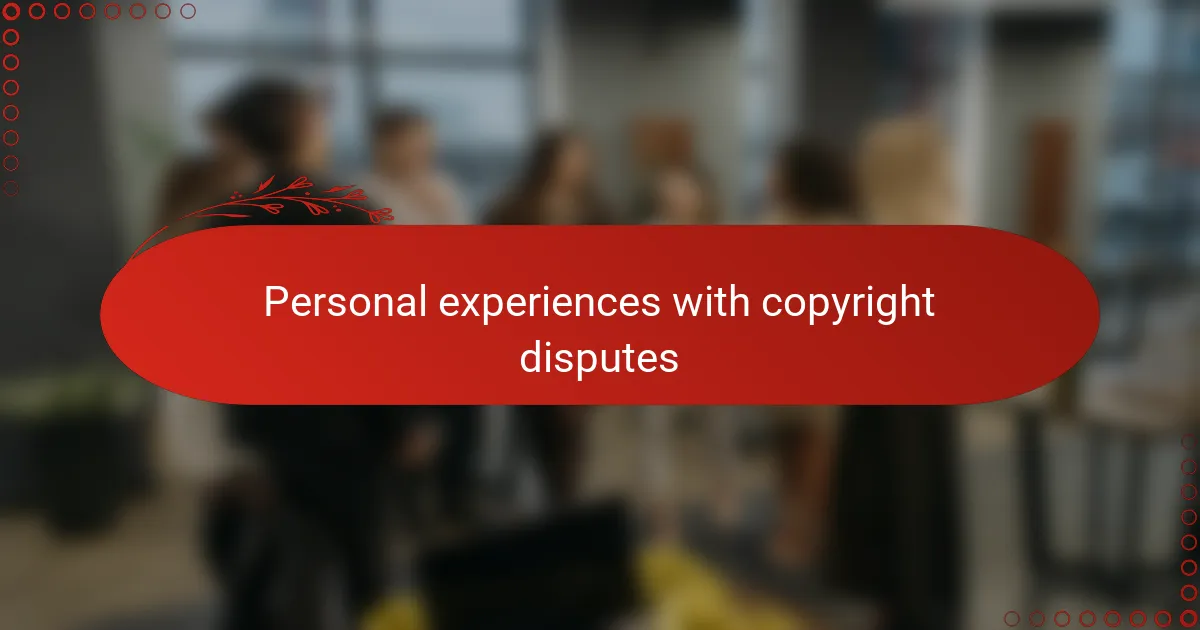
Personal experiences with copyright disputes
There was a moment early in my career when a copyright dispute caught me completely off guard. We had aired a track that, unbeknownst to me at the time, wasn’t properly licensed for broadcast. The station received a formal complaint, and I felt the weight of responsibility sinking in—it wasn’t just a mistake on paper; it impacted real people behind the music. Have you ever experienced that sudden rush of anxiety when you realize you might have crossed a legal line without meaning to?
Another time, I found myself tangled in a dispute over a sound effect used during a segment. Although minor, the claim escalated and required hours of back-and-forth communications to resolve. That experience taught me how even the smallest elements can lead to significant challenges if copyright is overlooked. It made me more vigilant but also aware of how complex rights management becomes behind the scenes.
What stands out most in these disputes is the emotional rollercoaster—the frustration of navigating unclear rules combined with the genuine concern to honor creative ownership. Each dispute has shaped my respect for copyright laws and motivated me to stay proactive. Isn’t it fascinating how these legal hurdles, while daunting, ultimately deepen our appreciation for the art we share?
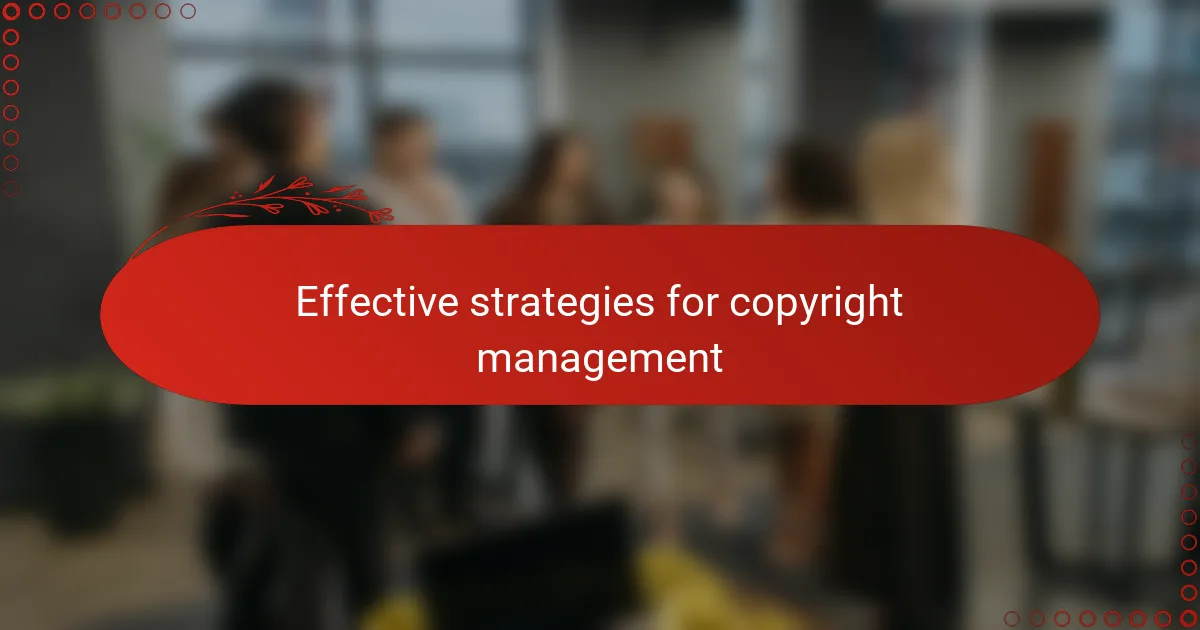
Effective strategies for copyright management
One strategy that really worked for me was setting clear protocols before going on air. I made it a rule to double-check that every piece of music or audio clip had the right license in place, even under tight deadlines. This habit saved me from last-minute panic and helped maintain a smooth broadcast flow. Have you ever found that a little preparation upfront can prevent so many headaches down the road?
Another approach I found effective was investing time in educating not just myself but the whole team on copyright essentials. When everyone understands why certain permissions matter, it creates a culture of respect and vigilance. I remember how those conversations transformed our daily routines—suddenly, compliance wasn’t a chore but a shared responsibility. Isn’t collaboration one of the best ways to stay ahead of potential issues?
Lastly, I highly recommend establishing open communication lines with rights holders and licensing bodies. Early in my career, having a contact I could call directly made all the difference during urgent situations. Instead of scrambling to interpret complex terms alone, I got straightforward answers that helped me act confidently on air. Don’t you think having that kind of support is invaluable when seconds count?
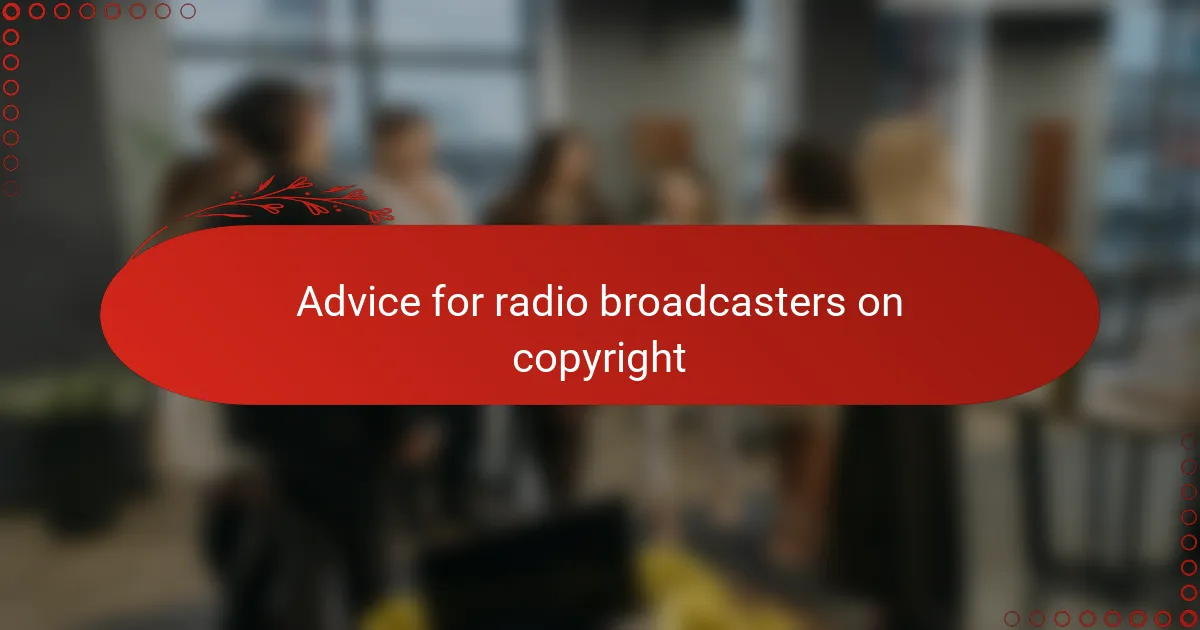
Advice for radio broadcasters on copyright
One piece of advice I always share is to never underestimate the value of staying organized with your licenses and permissions. Early on, I learned the hard way that a missing license can quickly turn a smooth show into a stressful scramble. Have you ever felt that panic when you realize you might be playing something without the proper rights? Keeping meticulous records can save you from that exact moment.
Another tip I swear by is building relationships with licensing agencies and rights holders. When I started reaching out proactively, I discovered it’s much easier to get quick clarifications or last-minute approvals. Isn’t it better to have a trusted contact than to be left guessing in the heat of a live broadcast? Trust me, those connections are worth their weight in gold.
Finally, training your team on copyright basics pays dividends you can’t always see right away. I made it a point to share stories of near-misses and mistakes, which sparked real conversations and heightened awareness across the board. Have you noticed how a well-informed team naturally avoids costly errors? In my experience, it transforms copyright compliance from a chore into a shared mission.
